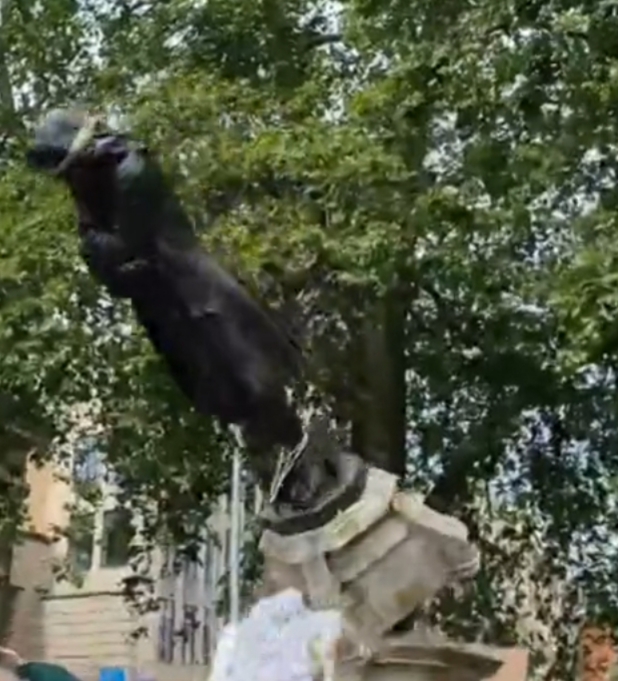Tom Baldwin, Bristol Socialist Party
Triumphant cheers filled the air as the statue of slave-trader Edward Colston in Bristol was pulled down by a multiracial crowd of Black Lives Matter (BLM) demonstrators on Sunday 7 June. The toppling of Colston was like knocking over the first domino. Across the world there are now discussions about removing the statues of those involved in colonialism and the slave trade.
Colston was a Tory MP in Bristol and deputy governor of the Royal African Company in the late 1600s. During his time with the company it transported over 84,000 Africans to be sold as slaves in the Americas. 19,000 didn’t survive the crossing, with the sick often thrown into the sea. Dropping his statue into the harbour was hugely symbolic.
It has been argued that toppling statues erases the history behind them. However, for 125 years the statue stood above a plinth proclaiming Colston as one of Bristol’s “most virtuous and wise sons”, without any mention of slavery.
Bristol has very few public displays that describe the real history of its central role in the transatlantic slave trade. Only tearing down the statue has allowed it to be placed in its proper historical context. It is likely that the schools, streets and buildings that also bear Colston’s name will now be changed too.
Tory Home Secretary Priti Patel has described bringing down the statue as “utterly disgraceful”, while Labour leader Keir Starmer said it was “completely wrong”. Bristol’s Labour mayor Marvin Rees has reflected local opinion and refused to criticise the action. The protesters achieved in moments what his administration has failed to do in four years.
Organisations around the world are now considering taking down their statues. This doesn’t represent a sudden collective pang of conscience so much as a worry that demonstrators will do what they so far have not.
European capitalism was built on the foundation of colonial plunder and enslavement. Statues celebrating its leading figures stand across the continent. That some might be removed is a victory for the BLM movement. Others, however, will be defended. For example, to remove the statues of various British monarchs because of their role in the slave trade would be too damaging to the image of Britain’s ruling class.
Removing a few ‘lesser’ statues, however, is an easy concession by the institutions of capitalism. They can make a public display of taking down statues without doing anything to challenge the deeper issues of racism and inequality. We oppose not just the racist symbols of the past but the racist system of the present.
The Labour mayors and councillors who are reviewing statues in their areas are the same ones that have refused to stand up to Tory cuts, have slashed spending on youth services, housing, leisure centres, and cut jobs and workers’ conditions.
In a survey for local paper the Bristol Post, 61% of respondents thought protesters were right to pull down Colston’s statue. Polls show a majority of people in Britain now support BLM. However, Johnson has cynically tried to whip up opposition to the movement using the issue of statues.
Crowds of mainly far-right demonstrators gathered around the cenotaphs in Bristol, London and other cities 13-14 June. This ‘protection’ is unnecessary. Bristol’s war memorial was untouched by the 10,000 strong demonstration that brought down Colston. It’s an attempt to intimidate BLM protesters and frame them all as indiscriminate vandals. The violence and the Nazi salutes showed the real nature of many of these ‘counter-protestors’.
In response to the threat from racist thugs, the BLM demonstration organised for Hyde Park in central London was cancelled. However, without putting pressure on anyone to take risks by attending, any BLM protest would have massively outnumbered the presence of the far right. Properly organised stewarding and weight of numbers can protect demonstrators. The workers’ movement needs to weigh in with unequivocal support for BLM and assistance in defending demonstrations. The far right cannot be allowed to organise openly without a response.
As well as defending against the right, the movement needs to advance its own demands. The fight against police brutality and systemic racism is gaining in impetus.
Demands like ‘jobs and homes not racism’, linking the fight against racism to the fight against the impoverishment of a generation of working class youth, are also gaining an echo. To completely rid society of these ills means we must smash the capitalist system which is based on the division and exploitation of working people.
Bringing down Colston and the ripple effects it has created are a source of pride for ordinary people in Bristol, but it is only the beginning.








